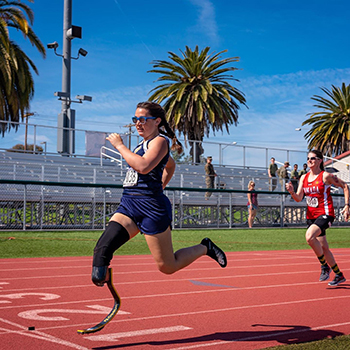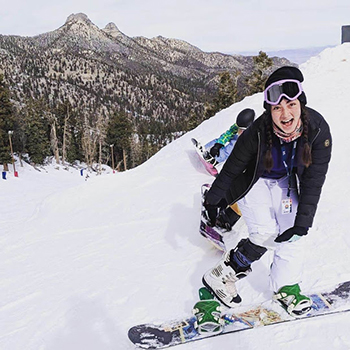 U.S. Marine Corps Lance Cpl. Hutsler competing in track by crossing the finish line at the 2020 U.S. Marine Corps Trials in Camp Pendleton, California, March 2020. She won gold in the event. (Photo by Marine Corps Gunnery Sgt. Nathan Cleary.)
U.S. Marine Corps Lance Cpl. Hutsler competing in track by crossing the finish line at the 2020 U.S. Marine Corps Trials in Camp Pendleton, California, March 2020. She won gold in the event. (Photo by Marine Corps Gunnery Sgt. Nathan Cleary.)
Archery was the first adaptive sport and therapeutic activity I was introduced to, which opened a whole new world for me. I loved going to archery practice and from there I kind of just expanded my possibilities. Archery was the one thing that got me up in the morning, especially on days I didn’t want to get up. WAR-P adaptive reconditioning activities and sports gave me a sense of purpose at a time where I felt I had no purpose in the Marine Corps anymore.
Renewed Passion to Compete
Track is my favorite adaptive sport to compete in. As a Marine and someone with two legs, I hated running. But when I was limb salvaged for 14 months, I missed what I couldn’t do, and running was the biggest thing for me. I love running now. I’m on a track team now and it’s a freeing experience to be able to run again.
My participation in various adaptive sports and reconditioning activities in the WAR-P led to my selection to participate in the Marine Corps Trials at Camp Pendleton, California. During my first Marine Corps Trials in 2019, I competed in six adaptive sports: wheelchair racing, wheelchair rugby, seated volleyball, archery, shooting, and swimming.
Two weeks after the Trials, I had my right leg amputated below the knee. I begged and asked, ‘If I heal enough can I do the Warrior Games?’
Nobody believed I could do it.
I worked hard and showed up a month before the Warrior Games with my doctor’s approval to compete. In only eight weeks post amputation, I competed in the 2019 Warrior Games, in Tampa, Florida, representing the USMC as one of 40 Marine team members. I competed in four adaptive sports: wheelchair racing, wheelchair rugby, archery, and swimming. I competed with over 300 RSMs and veterans representing teams from the Army, Navy, Air Force, SOCOM, and a couple of international teams from the United Kingdom, Canada, and Australia.
Being able to compete in the Warrior Games was incredible. It felt good to see all these other athletes because either someone is inspiring you or you are inspiring someone. As military we’re all competitive against each other but there’s still such a comradery. The Warrior Games is a competition like nothing else in the world.
 Marine Corps Lance Cpl. Hutsler in 2018 snowboarding with an IDEO brace in Lee Canyon, Las Vegas. The IDEO brace was one of her many limb salvage braces prior to amputation. (Courtesy Photo.)
Marine Corps Lance Cpl. Hutsler in 2018 snowboarding with an IDEO brace in Lee Canyon, Las Vegas. The IDEO brace was one of her many limb salvage braces prior to amputation. (Courtesy Photo.)
The Road Ahead
My biggest takeaway that I’ve learned from Military Adaptive Sports is don’t let anyone tell you what you can or can’t do. When I was limb salvaged everyone was like, ‘you’re not going to run track.’ I did it in a wheelchair and now that I’m an amputee, I can run on a blade. If you set your mind to it, you can do whatever you want.
I see myself continuing with the adaptive sport community for the rest of my life. I’m connected to a lot of adaptive sport and recreation organizations. It gives me a sense of belonging when I’m with people like me.
Now, I’m training for the Paralympics in snowboarding and I credit that to Military Adaptive Sports Program and WAR-P. Because of the Warrior Games, various adaptive sports contacts, and my confidence level in my own adaptive sports abilities, I realized that making the U.S. Paralympics team is a dream that I can make a reality. When I achieve my goals [now] it’s so much more rewarding because I had to work harder to get there.
Connecting Disabled Veterans
Anytime I meet someone who is a disabled veteran, I ask ‘Have you ever done the Warrior Games?’
I give them contacts if they are interested in participating in adaptive sports. The Warrior Games was such a big thing for me mentally and emotionally that I feel like everybody should have the chance to participate.”
To learn more about Military Adaptive Sports, visit Warrior Care
To learn more about the USMC Wounded Warrior Regiment and the WAR-P Program visit https://www.woundedwarrior.marines.mil/;